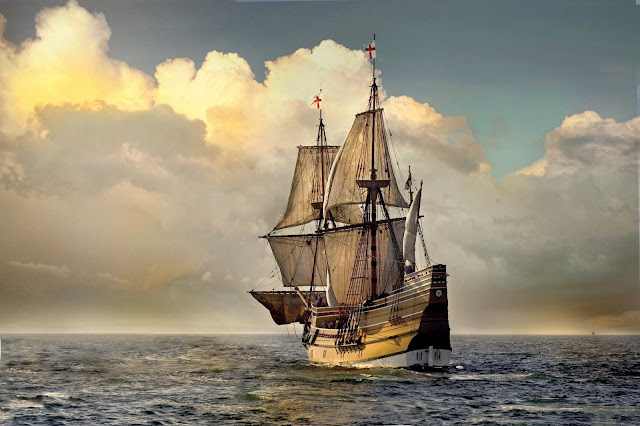Always Abound With Thanksgiving
Does history intrigue you as it does me? When I
read historical accounts, a movie seems to play in my mind, and I can picture
the event and sense the emotions.
That happened this week when I considered Thanksgiving and found myself reading The
Mayflower Compact. So, let me set the scene.
https://www.britannica.com/topic/Mayflower-ship
On a crisp September morning, over one hundred men, women, and children prepared to set sail from England to reach a new, unsettled land across the Atlantic. Calm and smooth seas prevailed at first, but soon the wind whipped. Great swells rocked the mighty ship, and storms churned the waters. Overcrowding made the voyage uncomfortable. Hot tempers emerged and desired to dominate as they sailed toward their destination—northern Virginia.
But these passengers were Christians on a
specific mission. And they believed if a man’s ways please the LORD, He
establishes their thoughts, makes enemies to be at peace with them, and He
alone directs their path.[1]
Tempests filled the sails with boisterous wind that
blew the Mayflower off course. Finally, after sixty-five days at sea, a crew
member high in the bird’s nest shouted, “Land ho.”
Joy filled their hearts. These adventurous,
brave souls knew freedom to worship God according to His Holy Word—and not
according to the rules of the state church was now within reach. And while this
most honorable goal greatly pleased the LORD, it wasn’t their primary purpose
for leaving home.
Still, had the Pilgrims arrived in Virginia as
planned, they would have remained under the established rule of King James of
England. And they may never have learned how to govern themselves with God as
their only King.[2]
So, when the ship neared the coast of Cape Cod
and dropped anchor, God’s wisdom prevailed. The Pilgrims knew chaos would ensue
without the rule of law. Thus, those ready to disembark paused, prayed and
drafted the document we now know as the Mayflower Compact.
“In the presence of God and one another,”
forty-one men covenanted and combined themselves together into a civil body
politic. “For the glory of God,” they penned as their first and highest goal,
“and advancement of the Christian faith….” Like missionaries, they desired to
spread the Gospel of Jesus Christ to the natives and to live peaceful lives
worshiping Almighty God.
“…Just and equal laws, ordinances, acts,
constitutions, and offices would be meete (appropriate),” they wrote, “…for the
general good of the Colonie unto which we promise all due submission and
obedience. In witness whereof, we have hereunder subscribed our names at
Cape-Codd the 11. of November…Anno Dom. 1620.”
The Great Commission[3]
spurred these Pilgrims to leave their country, their families, and all the
comforts of a “civilized” land. God directed them to a new continent and
inspired The Mayflower Compact to govern it.
After Columbus’s 1492 discovery, the 1620
landing at Plymouth Rock is what we look to as America’s beginning—not our
birthday—since King James still ruled. However, when we did free ourselves from
England, historians tell us Thomas Jefferson considered The Mayflower Compact
when drafting our 1776 Declaration of Independence.
All in all, the citizens of Plymouth Colony gladly
served the King of Kings—and had He not sent them to Cape Cod—to these kind
natives, they surely would have perished. A year later, grateful Pilgrims and
Natives held a feast lasting three days. They thanked God for His provision and
blessings, for guiding them, preserving them, and for sending aid just when
they needed it.
Four
hundred-two years later, we have a nation no one then could have imagined, yet
it is a nation in decline. So, as the Pilgrims did, let us always abound with thanksgiving[4]
for blessings, guidance, preservation, and aid. But also pray God upholds
America until Jesus appears for His Bride.


.jpg)

Comments
Post a Comment
I would love to read your comments and try to answer any questions. Let's learn together.